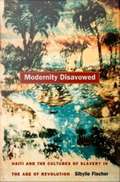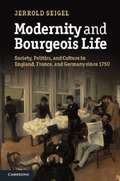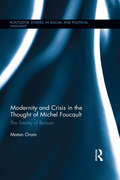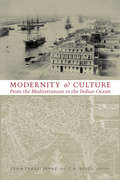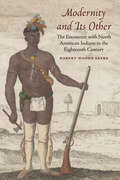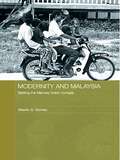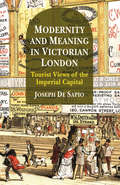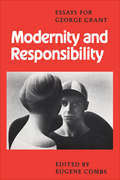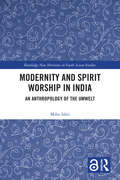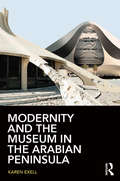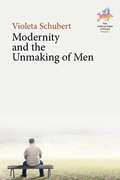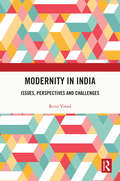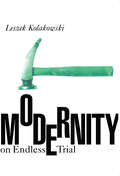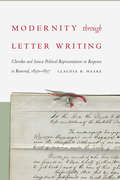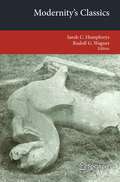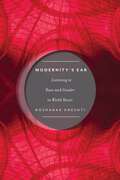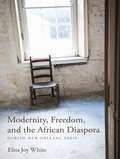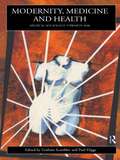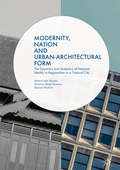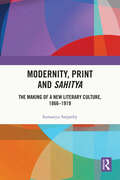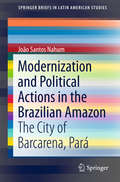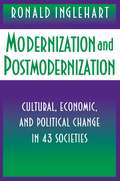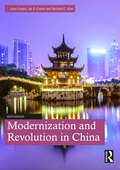- Table View
- List View
Modernity Disavowed: Haiti and the Cultures of Slavery in the Age of Revolution
by Sibylle FischerModernity Disavowed is a pathbreaking study of the cultural, political, and philosophical significance of the Haitian Revolution (1791-1804). Revealing how the radical antislavery politics of this seminal event have been suppressed and ignored in historical and cultural records over the past two hundred years, Sibylle Fischer contends that revolutionary antislavery and its subsequent disavowal are central to the formation and understanding of Western modernity. She develops a powerful argument that the denial of revolutionary antislavery eventually became a crucial ingredient in a range of hegemonic thought, including Creole nationalism in the Caribbean and G. W. F. Hegel's master-slave dialectic. Fischer draws on history, literary scholarship, political theory, philosophy, and psychoanalytic theory to examine a range of material, including Haitian political and legal documents and nineteenth-century Cuban and Dominican literature and art. She demonstrates that at a time when racial taxonomies were beginning to mutate into scientific racism and racist biology, the Haitian revolutionaries recognized the question of race as political. Yet, as the cultural records of neighboring Cuba and the Dominican Republic show, the story of the Haitian Revolution has been told as one outside politics and beyond human language, as a tale of barbarism and unspeakable violence. From the time of the revolution onward, the story has been confined to the margins of history: to rumors, oral histories, and confidential letters. Fischer maintains that without accounting for revolutionary antislavery and its subsequent disavowal, Western modernity--including its hierarchy of values, depoliticization of social goals having to do with racial differences, and privileging of claims of national sovereignty--cannot be fully understood.
Modernity and Bourgeois Life
by Jerrold SeigelTo be modern may mean many different things, but for nineteenth-century Europeans 'modernity' suggested a new form of life in which bourgeois activities, people, attitudes and values all played key roles. Jerrold Seigel's panoramic new history offers a magisterial and highly original account of the ties between modernity and bourgeois life, arguing that they can be best understood not in terms of the rise and fall of social classes, but as features of their common participation in expanding and thickening networks that linked together distant energies and resources across economic, political and cultural life. Exploring the different configurations of these networks in England, France and Germany, he shows how their patterns gave rise to distinctive forms of modernity in each country and shaped the rhythm and nature of change across spheres as diverse as politics, money and finance, gender relations, morality, and literary, artistic and musical life.
Modernity and Crisis in the Thought of Michel Foucault: The Totality of Reason (Routledge Studies in Social and Political Thought)
by Matan OramFew studies of Foucault have examined his thought from a sustained interdisciplinary perspective. Through the interpretative prism of the concept of the ‘Totality of Reason’, this book suggests an original analytical reading of Foucault's thought. This book addresses Foucault’s characterizations of the Enlightenment, asking whether the developmental history of the modern conception of knowledge – from the Renaissance to the Enlightenment – warrants the conclusion he draws. From the perspective of a critical evaluation of Foucault's thesis on ‘the crisis of modernity’, the book examines whether Foucault, the philosophical and social critic, truly belongs to those intellectual trends known as a ‘deconstruction’ and ‘post-modernism’ that advocate a wholesale rejection of the project of modernity, demonstrating how a classification of this kind contributes to an impoverishment of our understanding of Foucault's thought. This book will attract the attention of readers interested in Foucault, and what is broadly perceived to be the ‘crisis of modernity’. It will appeal to scholars and advanced students of sociology, political philosophy and political science, psychology, philosophy, interdisciplinary studies and cultural studies.
Modernity and Culture: From the Mediterranean to the Indian Ocean
by C. A. Bayly Robert Ilbert Leila FawazBetween the 1890s and 1920s, cities in the vast region stretching from the Mediterranean Sea to the Indian Ocean were experiencing political, social, economic, and cultural changes that had been set in motion at least since the early nineteenth century. As the age of pre-colonial empires gave way to colonial and national states, there was a sense that a particular liberalism of culture and economy had been irretrievably lost to a more intolerant age.Avoiding such dichotomies as East/West and modernity/tradition, this book provides a comparative analysis of contested versions of the concept of modernity. The book examines not only the "high" culture of scholars and the literati, but also popular music, the visual arts, and journalism. The contributors incorporate discussion of the way in which the business in both commodities and ideas was conducted in the increasingly cosmopolitan cities of the time.
Modernity and Its Other: The Encounter with North American Indians in the Eighteenth Century
by Robert Woods SayreIn Modernity and Its Other Robert Woods Sayre examines eighteenth-century North America through discussion of texts drawn from the period. He focuses on this unique historical moment when early capitalist civilization (modernity) in colonial societies, especially the British, interacted closely with Indigenous communities (the “Other”) before the balance of power shifted definitively toward the colonizers. Sayre considers a variety of French perspectives as a counterpoint to the Anglo-American lens, including J. Hector St. John de Crèvecoeur and Philip Freneau, as well as both Anglo-American and French or French Canadian travelers in “Indian territory,” including William Bartram, Jonathan Carver, John Lawson, Alexander Mackenzie, Baron de Lahontan, Pierre Charlevoix, and Jean-Baptiste Trudeau. Modernity and Its Other is an important addition to any North American historian’s bookshelf, for it brings together the social history of the European colonies and the ethnohistory of the American Indian peoples who interacted with the colonizers.
Modernity and Malaysia: Settling the Menraq Forest Nomads (The Modern Anthropology of Southeast Asia)
by Alberto GomesBringing together over thirty years of detailed ethnographic research on the Menraq of Malaysia, this fascinating book analyzes and documents the experience of development and modernization in tribal communities. Descendents of hunter-gatherers who have inhabited Southeast Asia for about 40,000 years, the Menraq (also known as Semang or Negritos) were nomadic foragers until they were resettled in a Malaysian government-mandated settlement in 1972. Modernity and Malaysia begins with the ‘Jeli Incident’ in which several Menraq were alleged to have killed three Malays, members of the dominant ethnic group in the country. Alberto Gomes links this uncharacteristic violence to Menraq experiences of Malaysian-style modernity that have left them displaced, depressed, discontented, and disillusioned. Tracing the transformation of the lives of Menraq resulting from resettlement, development, and various ‘civilizing projects’, this book examines how the encounter with modernity has led the subsistence-oriented, relatively autonomous Menraq into a life of dependence on the state and the market. Challenging conventional social scientific understanding of concepts such as modernity and marginalization, and providing empirical material for comparison with the experience of modernity for indigenous peoples around the world, Modernity and Malaysia is a valuable resource for students and scholars of anthropology, development studies and indigenous studies, as well as those with a more general interest in asian studies.
Modernity and Meaning in Victorian London
by Joseph De SapioJoseph De Sapio examines how individuals not only understood their contacts with industrial modernity as distinct from the inherited traditional rhythms of the eighteenth century, but how they conceived of their own positions within the increasingly sophisticated political, social, and commercial paradigms of the Victorian years.
Modernity and Responsibility: Essays for George Grant
by Eugene CombsWhat is it to be modern? How does the world look through the eyes of a modern? Is it possible to bring the sensibility of the non-modern to bear on the world around one? If so, how?The essays in this volume consider these and a number of related questions in an attempt to determine how a thoughtful individual can understand and act justly in the world of modernity. The authors stand firmly and deeply in modernity, but they are profoundly aware of the classical and the Judaeo-Christian traditions that the modern world has largely discarded and of non-Western traditions that ask profound questions about the nature of man and his role in the universe. They are willing to ask difficult and critical questions about traditional thought and about the assumptions, often tacit, of modernity.The essays explore the problematic nature of the concept of transcendence in modern social and political philosophy. They start with an analysis of Spinoza's use of biblical criticism to separate political philosophy and divine revelation, and explore the impact of the rise of naturalistic individualism in the North Atlantic world. A discussion of the role of the transcendent and of traditional philosophy in the East helps the reader to gain a deeper understanding of the process of secularization in the West. The issue of moral responsibility is shown to be greatly influenced by the existence of the concept of transcendence, and philosophy and the apocalyptic tradition form the basis of attempts to bridge the gulf between the traditional and the modern, secular view of the world.These essays show that the quest for the grounds of responsible action requires a thorough-going critique of modernity that looks not only at the modern world, but beyond it, to the traditions that formed and still inform it, and to the experience of other cultures that are also facing the processes we already take for granted.
Modernity and Spirit Worship in India: An Anthropology of the Umwelt (Routledge New Horizons in South Asian Studies)
by Miho IshiiThis book investigates the entangled relations between people’s daily worship practices and their umwelt in South India. Focusing on the practices of spirit (būta) worship in the coastal area of Karnataka, it examines the relationship between people and deities. Based on extensive fieldwork, this book links important anthropological theories on personhood, perspectives, transactions, and gift-exchanges together with the Gestaltkreis theory of Viktor von Weizsäcker. Firstly, it examines the relations between būta worship and land tenure, matriliny, and hierarchy in the society. It then explores the reflexive relationship between modern law and current practices based on conventional law, before examining new developments in būta worship with the rise of environmental movements and mega-industries. Furthermore, this book sheds light on the struggles and endeavours of the people who create and recreate their relations with the realm of sacred wildness, as well as the formations and transformations of the umwelt in perpetual social-political transition. Modernity and Spirit Worship in India will be of interest to academics in the field of anthropology, religious studies and the dynamics of religion, and South Asian Culture and Society.
Modernity and the Museum in the Arabian Peninsula
by Karen ExellModernity and the Museum in the Arabian Peninsula is dedicated to the recent and rapid high-profile development of museums in the Arabian Peninsula, focusing on the a number of the Arabian Peninsula states: Bahrain, Kuwait, Oman, Qatar and theUAE. These Gulf states are dynamically involved in the establishment of museums to preserve and , represent their distinct national culture and heritage, as well as engaging in the regional and global art worlds through the construction of state-of-the-art art museums. Alongside such developments is a rich world of collection and displaying material culture in homes and private museums that is little known to the outside world. Museum Studies literature has struggled to keep pace with such developments and Modernity and the Museum in the Arabian Peninsula is the first book to coherently present: a contemporary overview of the ever-evolving landscape of museums and related heritage projects in the Arabian Peninsula a critical evaluation of the nature of these museum projects within the political and cultural conditions in the Arabian Peninsula suggestions for productive ways forward for museum developments in the Arabian Peninsula Museums Studies students and museum professionals now have a book that fills an important gap in the picture of the museum worldwide. Contextualising this study in the history and politics of the region, from a scholar working within the region, this in-depth overview and critical analysis of museums in the Arabian Peninsula stands alone as an entry into this important topic.
Modernity and the Unmaking of Men (New Anthropologies of Europe: Perspectives and Provocations #1)
by Violeta SchubertResponding to the renewed emphasis on the significance of village studies, this book focuses on aging bachelorhood as a site of intolerable angst when faced with rural depopulation and social precarity. Based on ongoing ethnographic fieldwork in contemporary Macedonian society, the book explores the intersections between modernity, kinship and gender. It argues that as a critical consequence of demographic rupture, changing values and societal shifts, aging bachelorhood illuminates and challenges conceptualizations of performativity and social presence.
Modernity in Health and Disease Diagnosis: The Account from STEM Women (Sustainable Development Goals Series)
by Eucharia Oluchi NwaichiThis book gathers contributions highlighting the role of women in science, with a focus on health and disease.Women have contributed in no small way to the wealth of knowledge and discoveries in various aspects of health.The 21st century has been dubbed the "Knowledge Economy" due to a substantial increase in the accessibility of information, leading individuals to become more knowledgeable and well-rounded.Given the fact that irrespective of the field of study, knowledge eventually decays, more women in the 21st century have been at the forefront extending the frontiers of knowledge in the field of STEMM (Science Technology Engineering Mathematics Medicine) - engaging in rigorous research and making significant contributions in the field. Letting their voices heard through their well-researched published studies is a significant way of encouraging other upcoming women scientist and bringing advances in disease diagnosis to achieve SDG3.The contributions in this book aim to increase visibility of women in the field of science and to serve as a source of inspiration to everyone.
Modernity in India: Issues, Perspectives and Challenges
by Renu VinodThis book introduces a sociological understanding of the emergence of modernity in India and its ramifications on society, economy, and polity. It outlines the main features and context of modernity, as described in classical and later texts of modernity. The essays examine the transformation of Indian society as a consequence of the British colonial encounter resulting in social, economic, and political interventions. It also delineates the Indian context by defining the term community, and its close association with caste and religion, and subsequently examines the challenges in building a pan-Indian or national consciousness with a sense of ‘we-ness’ or common identity. Most importantly, the book also studies the politics of government formation after independence, and the role of dominant castes and classes in gaining power at the Centre. The book concludes with an outline of the definitions and historical practices of social exclusion in India, their contemporary configurations, the image of a socially, economically, and politically exclusive Indian modernity that poses challenges to the Indian state and civil society on account of the exclusion of multiple groups. This book would be useful to the students, researchers and teachers of sociology, women and gender studies, history, economics, political science, and other interdisciplinary courses in social sciences. The book will also be valuable reading for those interested in South Asian studies, especially post-colonial contemporary Indian society.
Modernity on Endless Trial
by Leszek Kolakowski,Leszek Kolakowski delves into some of the most intellectually vigorous questions of our time in this remarkable collection of essays garnished with his characteristic wit. Ten of the essays have never appeared before in English. "Exemplary. . . . It should be celebrated." —Arthur C. Danto, New York Times Book Review "This book . . . express[es] Kolakowski's thought on God, man, reason, history, moral truth and original sin, prompted by observation of the dramatic struggle among Christianity, the Enlightenment and modern totalitarianism. It is a wonderful collection of topics." —Thomas Nagel, Times Literary Supplement "No better antidote to bumper-sticker thinking exists than this collection of 24 'appeals for moderation in consistency,' and never has such an antidote been needed more than it is now." —Joseph Coates, Chicago Tribune "Whether learned or humorous, these essays offer gems in prose of diamond hardness, precision, and brilliance." —Thomas D'Evelyn, The Christian Science Monitor A "Notable Books of the Year 1991" selection, New York Times Book Review—a "Noted with Pleasure" selection, New York Times Book Review—a "Summer Reading 1991" selection, New York Times Book Review—a "Books of the Year" selection, The Times.
Modernity through Letter Writing: Cherokee and Seneca Political Representations in Response to Removal, 1830–1857
by Claudia B. HaakeIn Modernity through Letter Writing Claudia B. Haake shows how the Cherokees and Senecas envisioned their political modernity in missives they sent to members of the federal government to negotiate their status. They not only used their letters, petitions, and memoranda to reject incorporation into the United States and to express their continuing adherence to their own laws and customs but also to mark areas where they were willing to compromise. As they found themselves increasingly unable to secure opportunities for face-to-face meetings with representatives of the federal government, Cherokees and Senecas relied more heavily on letter writing to conduct diplomatic relations with the U.S. government. The amount of time and energy they expended on the missives demonstrates that authors from both tribes considered letters, memoranda, and petitions to be a crucial political strategy. Instead of merely observing Western written conventions, the Cherokees and Senecas incorporated oral writing and consciously insisted on elements of their own culture they wanted to preserve, seeking to convey to the government a vision of their continued political separateness as well as of their own modernity.
Modernity's Classics
by Rudolf G Wagner Sarah C. HumphreysThis book presents critical studies of modern reconfigurations of conceptions of the past, of the 'classical', and of national heritage. Its scope is global (China, India, Egypt, Iran, Judaism, the Greco-Roman world) and inter-disciplinary (textual philology, history of art and architecture, philosophy, gardening). Its emphasis is on the complexity of the modernization process and of reactions to it: ideas and technologies travelled from India to Iran and from Japan to China, while reactions show tensions between museumization and the recreation of 'presence'. It challenges readers to rethink the assumptions of the disciplines in which they were trained
Modernity's Ear: Listening to Race and Gender in World Music (Postmillennial Pop #3)
by Roshanak KheshtiInside the global music industry and the racialized and gendered assumptions we make about what we hear Fearing the rapid disappearance of indigenous cultures, twentieth-century American ethnographers turned to the phonograph to salvage native languages and musical practices. Prominent among these early “songcatchers” were white women of comfortable class standing, similar to the female consumers targeted by the music industry as the gramophone became increasingly present in bourgeois homes. Through these simultaneous movements, listening became constructed as a feminized practice, one that craved exotic sounds and mythologized the ‘other’ that made them.In Modernity’s Ear, Roshanak Kheshti examines the ways in which racialized and gendered sounds became fetishized and, in turn, capitalized on by an emergent American world music industry through the promotion of an economy of desire. Taking a mixed-methods approach that draws on anthropology and sound studies, Kheshti locates sound as both representative and constitutive of culture and power. Through analyses of film, photography, recordings, and radio, as well as ethnographic fieldwork at a San Francisco-based world music company, Kheshti politicizes the feminine in the contemporary world music industry. Deploying critical theory to read the fantasy of the feminized listener and feminized organ of the ear, Modernity’s Ear ultimately explores the importance of pleasure in constituting the listening self.
Modernity, Freedom, and the African Diaspora
by Elisa Joy WhiteElisa Joy White investigates the contemporary African Diaspora communities in Dublin, New Orleans, and Paris and their role in the interrogation of modernity and social progress. Beginning with an examination of Dublin's emergent African immigrant community, White shows how the community's negotiation of racism, immigration status, and xenophobia exemplifies the ways in which idealist representations of global societies are contradicted by the prevalence of racial, ethnic, and cultural conflicts within them. Through the consideration of three contemporaneous events-the deportations of Nigerians from Dublin, the aftermath of Hurricane Katrina in New Orleans, and the uprisings in the Paris suburbs-White reveals a shared quest for social progress in the face of stark retrogressive conditions.
Modernity, Medicine and Health
by Graham Scambler Paul HiggsThis book establishes the voice of medical sociology in key debates in the social sciences. Concerning modernity, postmodernity, structuralism and poststructuralism issues covered include: * disease and medicine in postmodern times * gender, health and the feminist debate on the postmodern * ageing, the lifecourse and the sociology of health and ageing * medicine and complementary medicine * death in postmodernity.
Modernity, Nation and Urban-Architectural Form: The Dynamics and Dialectics of National Identity vs Regionalism in a Tropical City
by Shireen Jahn Kassim Norwina Mohd Nawawi Mansor IbrahimThis book explores how Malaysia, as a multicultural modern nation, has approached issues of nationalism and regionalism in terms of physical expression of the built environment. Ever since the nation’s post-Colonial era, architects and policy makers have grappled with the theoretical and practical outcomes of creating public architecture that effectively responds to traditions, nationhood and modernity. The authors compile and analyse prevailing ideas and strategies, present case studies in architectural language and form, and introduce the reader to tensions arising between a nationalist agenda and local ‘regionalist’ architectural language. These dichotomies represent the very nature of multicultural societies and issues with identity; a challenge that various nations across the globe face in a changing environment. This topical and pertinent volume will appeal to students and scholars of urban planning, architecture and the modern city.
Modernity, Print and Sahitya: The Making of a New Literary Culture, 1866-1919
by Sumanyu SatpathyThe advent of print heralded a significant chapter in the history of colonial modernity in South Asia. This book narrates the story of the emergence of a new literary culture, Utkal sahitya or Odia literature, in the context of similar but conflicting linguistic-territorial cultures of Eastern India. The book is the first cross-cultural study of the emergence of a new literary culture in Eastern India with diverse, yet cognate languages in the years between 1866 and 1919. By researching a large corpus of archival material, it traces the emergence of a new literary culture that marked significant departures from traditional practices and understanding of the “literary,” and that was subsequently called, adhunik sahitya and argues that this was facilitated mainly by the formation of a public sphere in tandem with the rapid growth of educated print-public. While the phenomenon was by no means unique to Odia, the study identifies several local factors that were distinctive about its literary sphere by looking at its imbrication with sister linguistic cultures. It traces how, under political compulsions, a new intellectual class of Odias used agents of modernity such as print, education, new sciences, travel and communication etc. to forge a new aesthetic without completely breaking with the past. It examines the role that the Odia periodical press played, and traces the course it took from the time of its emergence from local political compulsions to the defining and broadening of the scope and limits of the question of the literary. It investigates the shifting and mutating dispositions of the newly emerged Odia print culture and public sphere while highlighting major concerns such as linguistic identity, historiography, literary histories, and canon formation as well as pioneering and consolidating new aesthetic forms. This book will be an important addition to the growing body of scholarship on literary cultures of multilingual India. Rich in archival work, this book will be of interest to students and researchers of literary history, cultural history, cultural studies, literature, literary history, literary and critical theory, and languages of Asia.
Modernité en transit - Modernity in Transit (Cultural Transfers)
by Dubé, Richard; Gin, Pascal; Moser, Walter; Pires, AlvaroEn 1979, Jean-François Lyotard a articulé la condition postmoderne, annonçant la fin de la modernité. Mais la modernité nous tient encore et se réinvente dans des nouvelles périodisations. Il nous incombe de reprendre la réflexion sur ce paradigme à la fois historique, culturel et social, et ceci, à partir de notre condition de « puînés » de la modernité. Tel est le programme de réflexion de cet ouvrage collectif qui privilégie une approche interdisciplinaire et internationale.
Modernization and Political Actions in the Brazilian Amazon: The City of Barcarena, Pará (SpringerBriefs in Latin American Studies)
by João Santos NahumThis book offers an analysis of the territory of Barcarena, in the Brazilian Amazon. The author studies the land use and the implemented modernization policies that made it one of the richest cities of the state. The political system uses this territory as a resource to provide for the needs of a small circle of social agents. A system of conservative political actions enforces the process of modernization of the Baracena territory. Innovations in the Barcarena territory, such as the implementation of the aluminium factory Albras/Alunorte and the territorial configuration or public administration, lead to modernization simulations and artificial devices. The intended effect however is more about appearing to be modern, than actual modernization. The territorial use of Barcarena is aimed to protect the interests and privileges of the elite.
Modernization and Postmodernization: Cultural, Economic, and Political Change in 43 Societies
by Ronald InglehartRonald Inglehart argues that economic development, cultural change, and political change go together in coherent and even, to some extent, predictable patterns. This is a controversial claim. It implies that some trajectories of socioeconomic change are more likely than others--and consequently that certain changes are foreseeable. Once a society has embarked on industrialization, for example, a whole syndrome of related changes, from mass mobilization to diminishing differences in gender roles, is likely to appear. These changes in worldviews seem to reflect changes in the economic and political environment, but they take place with a generational time lag and have considerable autonomy and momentum of their own. But industrialization is not the end of history. Advanced industrial society leads to a basic shift in values, de-emphasizing the instrumental rationality that characterized industrial society. Postmodern values then bring new societal changes, including democratic political institutions and the decline of state socialist regimes. To demonstrate the powerful links between belief systems and political and socioeconomic variables, this book draws on a unique database, the World Values Surveys. This database covers a broader range than ever before available for looking at the impact of mass publics on political and social life. It provides information from societies representing 70 percent of the world's population--from societies with per capita incomes as low as $300 per year to those with per capita incomes one hundred times greater and from long-established democracies with market economies to authoritarian states.
Modernization and Revolution in China
by Michael Kort June Grasso Jay CorrinExtensively revised and fully updated in this sixth edition, this popular textbook conveys the drama of China’s struggle to modernize against the backdrop of a proud and difficult history. Featuring a new analysis of the issues facing China’s fifth generation of leaders, it explores prominent developments including China’s relations with its neighbors and the United States, the humanitarian crises in Tibet and Xinjiang, and the progression of Xi Jinping. Incorporating new analytical summaries in each chapter and updated suggested readings, this new edition covers: The breakdown of imperial China in the face of Japanese and Western encroachments The struggles between the ideologies and armies of Chiang Kai-shek and Mao Zedong Mao Zedong’s Great Leap Forward and Cultural Revolution Deng Xiaoping’s reforms and the resulting dismantling of socialism and economic growth • China’s position as a world superpower and Xi Jinping’s leadership The Covid-19 pandemic Spanning the years from China’s defeat in the Opium Wars to its current status as a world superpower, the sixth edition of Modernization and Revolution in China is an essential textbook for courses on modern Chinese history, Chinese politics, and modern East Asia.
